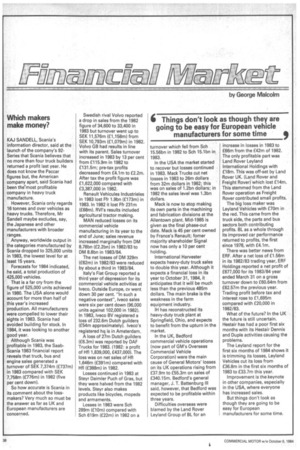6 Things don't look as though they are going to be easy for European vehicle
Page 42

If you've noticed an error in this article please click here to report it so we can fix it.
manufacturers for some time
turnover which fell from Sch 15.56bn in 1982 to Sch 15.1bn in 1983.
In the USA the market started to recover but losses continued in 1983. Mack Trucks cut net losses in 1983 to 26m dollars from 32m dollars in 1982; this was on sales of 1.2bn dollars; in 1982 the sales level was 1.3bn dollars.
Mack is now to stop making its own parts in the machining and fabrication divisions at the Allentown plant. Mid-1985 is given as the final phase-out date. Mack is 45 per cent owned by France's Renault; fomer majority shareholder Signal now has only a 10 per cent holding.
International Harvester expects heavy-duty truck sales to double this year. Although it expects a financial loss in its year to October 31, 1984, it anticipates that it will be much less than the previous 485m dollars. The main brake is the weakness in the farm equipment industry.
IH has reconstructed its heavy-duty truck plant at Springfield, Ohio, and expects to benefit from the upturn in the market.
In the UK, Bedford commercial vehicle operations (now part of GM's Overseas Commercial Vehicle Corporation) were the main cause of General Motors' losses on its UK operations rising from £37.9m to £55.3m on sales of £340.15m. Bedford's general manager, J. T. Battenburg III said, however, that Bedford was expected to be profitable within three years.
Difficulties overseas were blamed by the Land Rover Leyland Group of BL for an increase in losses in 1983 to £66m from the £42m of 1982. The only profitable part was Land Rover Leyland International Holdings with £18m. This was off-set by Land Rover UK. (Land Rover and Freight Rover) which lost £14m. This stemmed from the Land Rover operation as Freight Rover contributed small profits.
The big loss maker was Leyland Vehicles with £70m in the red. This came from the truck side, the parts and bus sectors both contributing profits. BL as a whole through its improved car performance returned to profits, the first since 1978, with £4.1m.
There was better news from ERF. After a net loss of £1.56m in its 1982/83 trading year, ERF Holdings reported a net profit of £677,000 for its 1983/84 year ended March 31 on a gross turnover down to £60.64m from E62.57m the previous year. Trading profit before tax and interest rose to £1,695m compared with £20,000 in 1982/83.
What of the future? In the UK the future is still uncertain. Hestair has had a poor first six months with its Hestair Dennis and Duple activities causing the problems.
The Leyland report for the first six months of 1984 shows it is trimming its losses, Leyland Vehicles cut its loss from £36.8m in the first six months of 1983 to £33.7m this year.
Improvement is the keynote in other companies, especially in the USA, where everyone has increased sales.
But things don't look as though they are going to be easy for European manufacturers for some time.




























































































































































